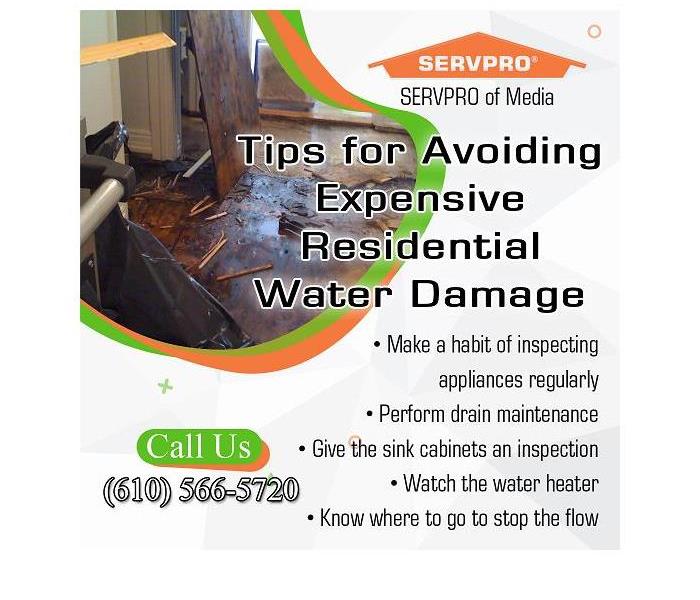How to Avoid Expensive Water Damage Restoration Expenses
6/3/2021 (Permalink)
Blog Summary: SERVPRO of Media, PA, offers tips on how to avoid an expensive water damage restoration project.
The Media, PA, water damage restoration professionals at SERVPRO specialize in providing a fast response to water damage at any time of the day or night. Water damage disasters need immediate attention to minimize the scope of the disaster and prevent advanced secondary damage. SERVPRO of Media is highlighting tips to help homeowners prevent water damage disasters in the home.
Five Tips for Avoiding Expensive Residential Water Damage
Every ten seconds, a water damage disaster disrupts a household, causing inconvenience, stress, and worry. Listed below are five tips to prevent water damage in the home.
- Make a habit of inspecting appliances regularly
Visually inspect the base of the dishwasher for leaks every time the latch is released to open the door to the appliance. Make the same inspection of the washing machine, which is the most commonly reported source of water intrusions in the home. Include the refrigerator in the inspection process. When the door opens, look for water at the base of the appliance.
Plumbing tip: Upgrade washing machine hoses from the standard rubber hoses to reinforced stainless steel braided hoses. These heavy duty hoses can last up to ten years before needing replacement. To be proactive in keeping the laundry room dry, replace the hoses every five years.
- Perform drain maintenance
Proper drain maintenance can prevent one of the messiest water damage disasters a homeowner can experience.
- Do not put grease down the drain. Eventually, the grease will solidify and choke off the water flow, and flushing the drain with warm or hot water will not prevent a drain clog. Harsh chemicals designed to resolve slow flowing drains can damage pipes. The safest and the least expensive solution overall is to purchase and use a drain snake.
- Do not put a strain on the strainer. Clean out the strainer and put food and other debris in the garbage can or on the compost pile, not in the drain or toilet.
- Test the tub’s overflow drain to ensure it is in proper working order. Discovering the overflow drain is inoperative or leaking when the tub is overflowing can be disastrous.
- Give the sink cabinets an inspection
- Look for standing water and wet items under the cabinet.
- Listen for drips.
- Feel for moisture on items under the cabinet and around the drain and water supply lines. Feel for wetness and moisture in inaccessible areas of the cabinet.
- Perform a smell test for a musty, earthy odor in the cabinet.
- Watch the water heater
The water heater is a common source of water damage and deserves the homeowner’s attention at least once a year. Annually inspect the water heater for leaks, odd noises, rust or corrosion, and any unexplained moisture or condensation. Hard water can cause corrosion, which shortens the life of the appliance. Drain and flush the tank each year or have a qualified plumber service the unit. Replace the anode rod every three to five years, depending on the quality of water and frequency of use. The heating elements usually last about six to ten years. Replacing the heating elements at the eight-year mark means that the proactive homeowner may never miss a drop of hot water or experience an unexpected cold shower on a frosty morning. To reduce the electric bill, consider upgrading to a water heater without a tank or an on-demand water heater.
- Know where to go to stop the flow
Knowing where the shutoff valves are and keeping them in prime working condition can prevent hundreds of gallons of water from flowing into a home while the homeowner waits for a plumber or frantically searches for the valve wrench or the main shutoff valve out by the street. Knowing where the whole house shutoff valve between the meter and the house is advised as well. Usually, this valve does not require a special tool.
Proper maintenance, early detection of a water intrusion, and immediate repair can prevent most water damage disasters and minimize the damage when a water intrusion does occur. The experienced, highly trained, and certified water damage restoration professionals at SERVPRO of Media are available 24/7 and can arrive on-site in about an hour to inspect and assess the damage, provide a detailed estimate, and move forward with solutions that get life back to normal as soon as possible. The professionals at SERVPRO of Media handle the time-consuming and complicated process of dealing with the insurance company. When a property damage disaster of any size strikes, call SERVPRO of Media.
For more information about water damage restoration in Broomall, PA, contact the office by phone at (610) 566-5720 or by email at office@SERVPROmedia.com.





 24/7 Emergency Service
24/7 Emergency Service
